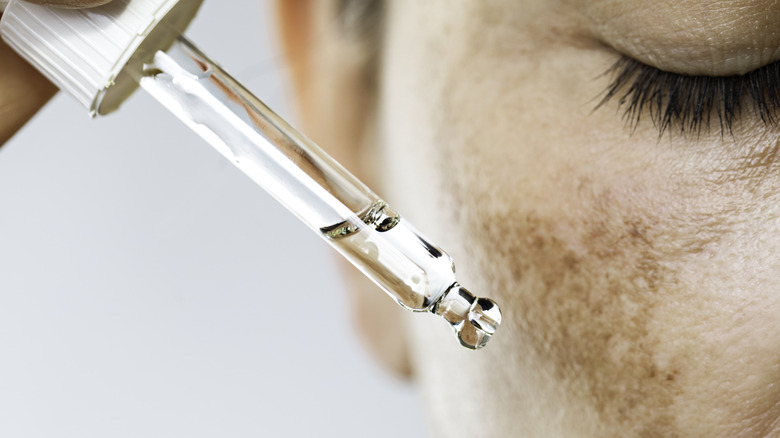All The Reasons Why Adding Sunflower Oil Into Your Skincare Routine Just Makes Sense
From coconut oil to olive oil to tea tree oil and more, several natural oils have been shown to be effective in improving and protecting your skin when applied topically. Natural oils work great as moisturizers for people with sensitive skin since they rarely cause allergic reactions and don't contain as many chemicals, according to Dr. Rajani Katta, board-certified dermatologist at Baylor College of Medicine (per Everyday Health). A less discussed oil for your skin, sunflower seed oil, offers these benefits and more, largely due to its high quantity of vitamin E and linoleic acid, an omega-6 fatty acid found in plant-based oils. Adding sunflower oil to your skincare routine is a prime example of how summer 2023's biggest skincare trends are about working smarter, not harder.
Have dry skin? Want to reduce fine lines around your eyes? Struggling with stubborn acne and the dark spots it leaves behind? Looking for a way to relieve irritation caused by inflammatory skin conditions? Studies (via ResearchGate) show that sunflower seed oil may help. What's more, you don't have to break the bank to take advantage of its many benefits — a 16oz bottle on Amazon costs around $15.
It moisturizes and soothes dry skin
As previously mentioned, sunflower seed oil contains a high quantity of linoleic acid (around 60 to 70%), a fatty acid that provides a barrier to the outermost layer of the skin referred to by dermatologists as the stratum corneum. According to dermatologist Dr. Ben Esdaile (per Women's Health), when applied to our skin, linoleic acid assists in the production of ceramides, lipids or fatty molecules that provide a barrier for the skin. This barrier keeps our skin hydrated by preventing transepidermal water loss (water that escapes and evaporates through the skin's surface). In other words, sunflower seed oil works as an excellent daily moisturizer for our skin.
What's more, if you have particularly irritated skin or a chronic inflammatory skin condition (atopic dermatitis, eczema, or psoriasis, for example) you could benefit from working sunflower oil into your skincare routine. "Those with irritated, inflamed, or dry skin would benefit from the addition of linoleic acid in their skin-care routine to add moisture, calm inflammation, and potentially help improve their overall skin barrier," says Dr. Nkem Ugonabo, M.D., a board-certified dermatologist (via Shape). In addition to linoleic acid, sunflower oil also contains a high amount of vitamin E, an anti-inflammatory agent that can soothe skin rashes and irritation.
It can help prevent sun damage
Vitamin E also protects our skin from free radical damage caused by environmental pollutants and ultraviolet light. Although not entirely a sunscreen, the vitamin E in sunflower oil has been shown to be effective for increasing photoprotection of the skin. When our skin is exposed to UV light, its vitamin E content (particularly in the stratum corneum) is lowered — a likely reason for why the vitamin E concentration in our skin declines with age.
UV-induced free radical damage can have devastating effects on our skin, from redness and discoloration to more serious effects such as skin cancer. It also is a main cause of premature signs of aging, such as fine lines and wrinkles. Vitamin E may help prevent inflammatory damage after UV exposure. According to dermatologist Amy Kassouf, M.D., while more research is needed, vitamin E may lessen sun damage by providing a barrier that absorbs UV rays and reduces your skin's inflammatory response (such as swelling, reddening, and thickening of the skin). This does not mean that you can use sunflower oil in place of SPF; instead, use it in combination with sunscreen to increase your photoprotection and prevent skin damage.
Sunflower oil works for all skin types
Another reason sunflower seed oil is so beneficial for our skin is that it is non-comedogenic, meaning it won't clog pores and can be used on any skin type. In addition to being an effective moisturizer, it can be used as a gentle makeup remover and face cleanser on oily, dry, or combination skin. NYC-based dermatologist Joshua Zeichner, M.D. told Shape, "Linoleic acid is non-irritating and can be used as a topical ingredient across all skin types." While it seems counterintuitive to put oil on oily or acne-prone skin, the ceramides produced in sunflower oil are beneficial for providing a healthy skin barrier that helps prevent acne.
Moreover, evidence shows that there may be a link between the development of acne and a deficiency of ceramides and linoleic acid in the skin, say Dr. Zeichner and Dr. Uganobo. So don't shy away from sunflower oil if you have acne, as it may decrease your breakouts and improve your overall skin condition.
This oil can help improve skin tone
Sunflower seed oil can help with hyperpigmentation caused by acne and free radicals, providing you with a more even skin tone if used regularly. The vitamin E found in the oil is a powerful antioxidant that can help protect the skin from sun damage that causes uneven skin tone. Applying sunflower seed oil can be a great way to safely resume your skincare routine after a sunburn.
Also, if you suffer from post-acne dark spots or melasma (a skin condition that causes dark spots and patches on the face), incorporating sunflower seed oil into your skincare routine may help even your skin tone. "Linoleic acid can also help improve skin turnover helping the skin appear softer and smoother," says Dr. Esdaile. So, if you are looking for soft, smooth, and glowing skin (who isn't?) try sunflower oil as a natural skincare product that works wonders.
Considerations and how to apply it
According to board-certified dermatologist Orit Markowitz, M.D. (per Byrdie), "Sunflower oil is very low risk." It can be used on sensitive skin, including those with inflammatory skin conditions like eczema or atopic dermatitis. If you have a nut allergy or any other food or skin allergy, you may want to consult with your doctor to make sure topical sunflower seed oil is safe for you to use. However, in general, having a nut allergy does not make you allergic to sunflower seeds. In fact, allergists recommend sunflower seeds as a safe substitute for people with nut allergies.
Dr. Joshua Zeichner says that sunflower seed oil can be used daily. If using the pure oil form, (instead of a lotion that contains sunflower oil) he advises applying it after you wash your skin and before putting on moisturizer. You can rub it into your skin until it's well absorbed and allow it to dry, then proceed with your daily face and body lotion on top. When shopping for the best product, look for organic, cold-pressed sunflower oil, as this signifies that the oil has been extracted from the seeds without the use of chemicals. These products will also typically be advertised specifically for skin, such as sunflower oil from Premium Nature and PURA D'OR.





